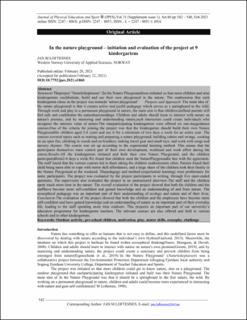In the nature playground – initiation and evaluation of the project at 9 kindergartens
Peer reviewed, Journal article
Published version
Permanent lenke
https://hdl.handle.net/11250/2771493Utgivelsesdato
2021Metadata
Vis full innførselSamlinger
- Import fra CRIStin [3604]
- Institutt for idrett, kosthald og naturfag [1006]
Originalversjon
Loftesnes, J. M. (2021). In the nature playground – initiation and evaluation of the project at 9 kindergartens. Journal of Physical Education and Sport (JPES), 21, 542-548. 10.7752/jpes.2021.s1060Sammendrag
Theproject ‘Naturleikeplassen’ (In the Nature Playground)was initiated so that more children and nine kindergartens couldinitiate, build and use their own playground in the nature. The outdoorarea that each kindergarten chose in the project was termeda ‘nature playground’. Purpose and Approach: The main idea of the nature playground is that it creates active and joyful pedagogy which serves as a springboard to the wild. Through work and play in a permanent playground in nature, the main aim is that children,staffand parents will feel safe and confidentin the naturalsurroundings. Children and adults should learn to interact with nature on nature's premise, and by mastering and understanding nature,such interaction could create individuals who recognise the intrinsic value of nature.The nineparticipating kindergartens were offered six one-dayguidance courses.One of the criteria for joining the project was that the kindergarten should build their own Nature Playgroundfor children aged 2-6 years and use it for a minimum of two days a week for an entire year. The courses covered topics such as starting and preparing a nature playground, building cabins and swings, cooking on an open fire, climbing in woods and on boulders, making travel gear and small toys, and work with songs and nursery rhymes. The course was set up according to the experiential learning method. This means that the participants themselves must control part of their own development, workload and work effort during the course.Results:All the kindergartens initiated and built their own Nature Playground, and the children participatedfrom2-4 days a week.We found that children used the NaturePlaygroundin line with the agreement. The staff found that the various courses led to them taking the children outdoorsmore often. Parents found their child being more able to cope with motor skill affordances, and a large share of the children took their family to the Nature Playground at the weekend. Thepedagogy and method (experiential learning) were problematic for some participants. The project was evaluated by the project participants in writing, through five open-ended questions. The supervisors also evaluated the project in an unstructured interview.The staff and the children spent much more time in the nature. The overall evaluation of the project showed that both the children and the staffhave become more self-confident and gained knowledge and an understanding of and from nature. The ecosophical pedagogy was an important part of their understanding of ecology and nature and of their lives. Conclusion:The evaluation of the project showed that both the children and the employees have become more self-confident and have gained knowledge and an understanding of nature as an important part of their everyday life, leading to the staff spending more time outdoors. This projectis an important part of our university’s education programme for kindergarten teachers. The relevant courses are also offered and held in various schools and in other kindergartens.

